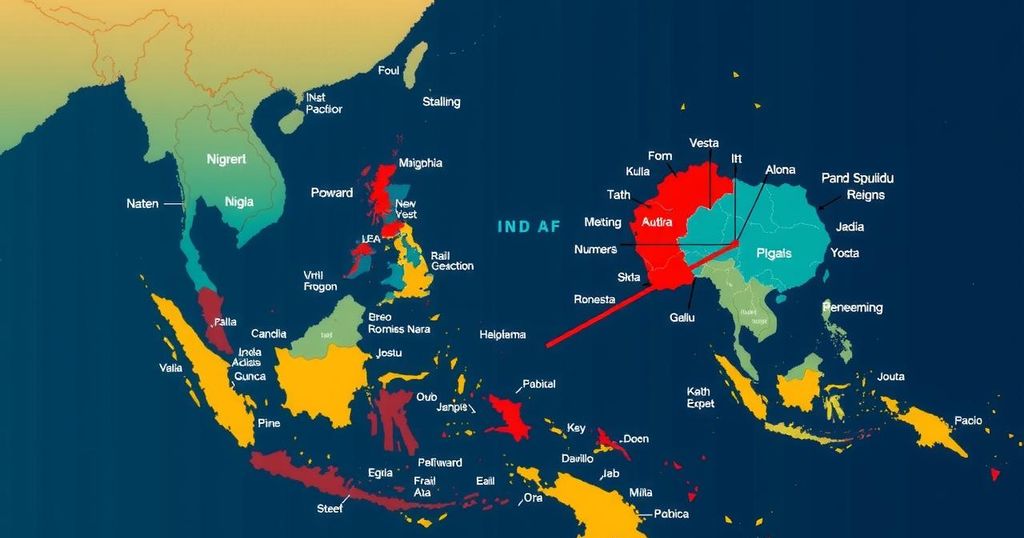Politics
” SINGH, ASEAN, ASIA, ASSOCIATION OF SOUTHEAST ASIAN NATIONS, DEFENCE, DEFENSE, ECONOMIC COOPERATION, GEOPOLITICS, GREEN ENERGY, INDIA, INTERNATIONAL RELATIONS, JAPAN, LAOS, LLOYD J AUSTIN, NA, NARENDRA MODI, NEW DELHI, NORTH AMERICA, RAJ, RAJNATH, RAJNATH SINGH, SINGH, SOUTH CHINA SEA DISPUTE, UNITED STATES, US
Dante Raeburn
Rajnath Singh Advocates for Rules-Based Order in Indo-Pacific Region
Defence Minister Rajnath Singh emphasized India’s commitment to a rules-based order in the Indo-Pacific during the ASEAN Defence Ministers’ Meeting-Plus, advocating for dialogue, maritime safety, and adherence to international law amid rising Chinese influence.
During the 11th ASEAN Defence Ministers’ Meeting-Plus in Vientiane, Laos, India’s Defence Minister, Rajnath Singh, asserted India’s commitment to establishing a rules-based international order in the Indo-Pacific, emphasizing the importance of dialogue for addressing complex regional issues. He reaffirmed India’s stance on preserving freedom of navigation, lawful commerce, and adherence to international law. Singh advocated for an inclusive framework that respects the sovereignty of all nations, particularly in light of China’s increasing assertiveness in the region.
The ASEAN bloc comprises ten Southeast Asian nations alongside eight dialogue partners, including prominent players such as India, China, Japan, Russia, and the United States. Singh underscored that any Code of Conduct in the Indo-Pacific should not compromise the legitimate rights of non-participating countries and must align with international law, specifically referencing the 1982 United Nations Convention on the Law of the Sea (UNCLOS).
The remarks align with ongoing challenges posed by China’s territorial disputes, particularly in the resource-rich South China Sea, where tensions have escalated with various ASEAN member states. Singh called for the effective implementation of agreements like the Declaration on the Conduct of Parties in the South China Sea and a substantive Code of Conduct that reflects international law principles.
Furthermore, Singh highlighted the necessity of embracing Buddhist principles of peaceful coexistence amid growing global polarization. He reiterated India’s philosophy of resolving international disputes through dialogue, which fosters trust and cooperation among nations.
Additionally, Minister Singh engaged in discussions with his Chinese counterpart to de-escalate tensions in the Ladakh region, following recent military disengagements. This dialogue underscores India’s commitment to fostering stability and confidence in bilateral relations as well as in the broader Indo-Pacific context.
The Indo-Pacific region has become a focal point for geopolitical tensions, particularly due to China’s assertive actions in maritime disputes with countries like Vietnam, the Philippines, and Malaysia. ASEAN, which includes ten Southeast Asian nations and has strategic dialogue partners, plays a crucial role in regional security and stability. India has positioned itself as a proponent of a rules-based order to promote peace and prosperity, countering growing Chinese influence. The diplomatic initiatives from Indian leaders emphasize not just bilateral relations but collective security frameworks within the ASEAN context while adhering to international legal standards.
In conclusion, India remains steadfast in advocating for a rules-based order in the Indo-Pacific, emphasizing the need for dialogue as an essential tool for conflict resolution. Defence Minister Rajnath Singh’s remarks during the ASEAN Defence Ministers’ Meeting solidify India’s intention to work collaboratively with regional partners to ensure peace, stability, and respect for international law. As tensions persist in the region, India’s approach underscores the importance of constructive engagement and adherence to established legal frameworks to address complex geopolitical challenges.
Original Source: www.hindustantimes.com








Post Comment